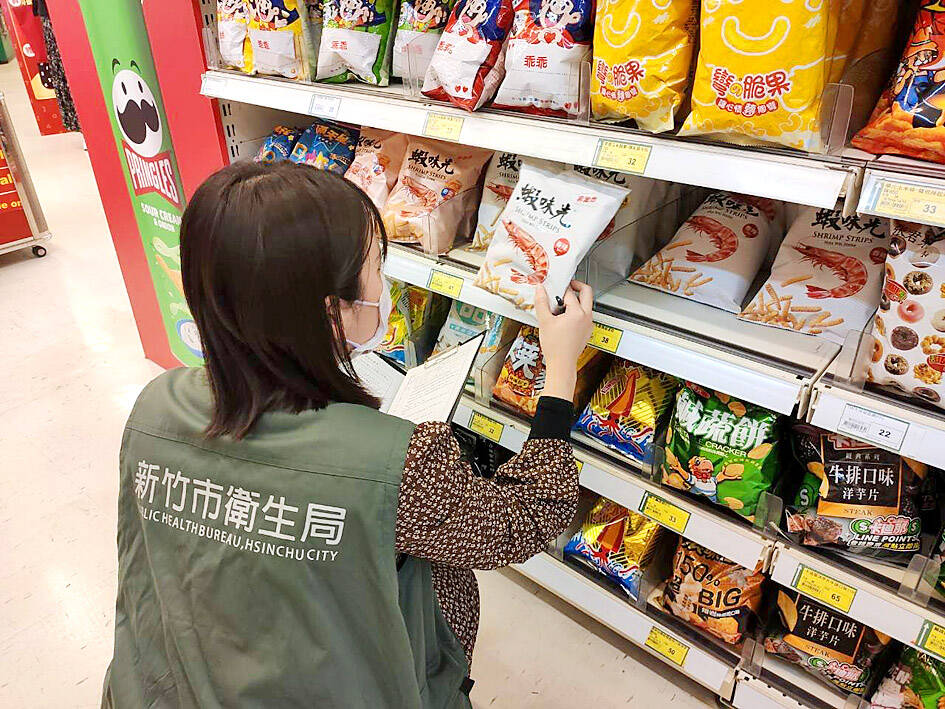The Food and Drug Administration (FDA) yesterday suspended chili pepper powder imports from China from 21 importers and manufacturers for three months after their products were found to contain Sudan III, a coloring agent banned in food in Taiwan.
A policy to test every shipment of chili powder imports from China, in effect since Dec. 11 last year, is to continue until June 10, FDA officials told a news conference, adding that more than 1.06 tonnes of products were recalled as of Monday.
The family of substances known as “Sudan reds” are categorized as Group II carcinogens by the WHO and typically used as an industrial dye for oils, wax and polymers, said Yen Tsung-hai (顏宗海), a toxicology expert at Linkou Chang Gung Memorial Hospital.

Photo courtesy of Hsinchu City Public Health Bureau
Sudan reds have been linked to increased cancer rates in lab animals and human consumption of the substance can lead to the formation of amines, a probable carcinogen for humans, Yen said.
PX Mart Co (全聯實業) has recalled all 11,824 chili powder bottles of the affected batch bearing an expiration date of Dec. 12 next year, the FDA said.
An investigation found that the contaminated material came from a shipment of Chinese chili powder imported by Bao Hsin Enterprises Co Ltd (保欣企業有限公司), FDA Deputy Director-General Lin Chin-fu (林金富) said.
The New Taipei City Department of Health on Feb. 9 found four parts per billion of Sudan III in samples taken from that shipment, resulting in the recall of food products by five additional manufacturers, including Yuzhong Food’s (裕榮食品股份有限公司) popular shrimp-flavored snacks, Lin said.
Ho Ho Yuan International Trade Co (禾禾園國際貿易有限公司), Shen Yan Co (申元有限公司), Yun Fang Spice Processing Factory (永芳香料加工所), Sun Sheng Foods Co (順盛食品原料有限公司) and Mares International Trading Co (瑪爾氏國際貿易) were among the companies that issued recalls, in addition to a company that appeared to have used an unaffected batch of chili powder, Lin said.
Food safety officials are confident that all affected manufacturers and distributors have been identified and no tainted products are on store shelves, he said.
The Yunlin County Public Health Bureau has filed a criminal complaint with the Yunlin District Prosecutors’ Office, the FDA said.
The agency increased the test coverage of chili powder from China to all shipments after observing a surge in consignments that failed food safety standards, Lin said.
Eight months before the FDA imposed the new standards, 172 shipments of Chinese chili powder were imported into Taiwan, of which 98 were inspected and 24 failed tests, a failure rate of about 25 percent, he said.
The tainted powder that ended up in the supply chain was imported on Oct. 23 last year before the standards were enhanced, he said.
The use of Sudan reds in food is punishable by up to seven years in prison commutable to an NT$80 million (US$2.54 million) fine, FDA Director-General Wu Shou-mei (吳秀梅) said.
Importing a food product without valid documentation, including its point of origin, is punishable by a NT$200 million fine and the possible suspension of the affected product line or company, Wu said.

‘FORM OF PROTEST’: The German Institute Taipei said it was ‘shocked’ to see Nazi symbolism used in connection with political aims as it condemned the incident Sung Chien-liang (宋建樑), who led efforts to recall Democratic Progressive Party (DPP) Legislator Lee Kun-cheng (李坤城), was released on bail of NT$80,000 yesterday amid an outcry over a Nazi armband he wore to questioning the night before. Sung arrived at the New Taipei City District Prosecutors’ Office for questioning in a recall petition forgery case on Tuesday night wearing a red armband bearing a swastika, carrying a copy of Adolf Hitler’s Mein Kampf and giving a Nazi salute. Sung left the building at 1:15am without the armband and apparently covering the book with a coat. This is a serious international scandal and Chinese

PERSONAL DATA: The implicated KMT members allegedly compiled their petitions by copying names from party lists without the consent of the people concerned Judicial authorities searched six locations yesterday and questioned six people, including one elderly Chinese Nationalist Party (KMT) member and five KMT Youth League associates, about alleged signature forgery and fraud relating to their recall efforts against two Democratic Progressive Party (DPP) legislators. After launching a probe into alleged signature forgery and related fraud in the KMT’s recall effort, prosecutors received a number of complaints, including about one petition that had 1,748 signatures of voters whose family members said they had already passed away, and also voters who said they did not approve the use of their name, Taipei Deputy Chief Prosecutor

UNDER ATTACK: Raymond Greene said there were 412 billion malicious threats in the Asia-Pacific region in the first half of 2023, with 55 percent targeting Taiwan Taiwan not only faces military intimidation from China, but is also on the front line of global cybersecurity threats, and it is taking action to counter those attacks, President William Lai (賴清德) said yesterday. Speaking at the opening of this year’s Cybersec Expo in Taipei, the president assured foreign diplomats and exhibitors that Taiwan remained committed to strengthening its defense against cyberattacks and enhancing the resilience of its digital infrastructure. Lai referenced a report from the National Security Bureau (NSB) indicating that the Government Service Network faced an average of 2.4 million intrusion attempts daily last year, more than double the figure

Retired US general Robert B. Abrams reportedly served as adviser to Chief of the General Staff Admiral Mei Chia-shu (梅家樹) during the Ministry of National Defense’s computer-simulated war games in the buildup to this year’s 41st annual Han Kuang military exercises, local media reported yesterday. For 14 days and 13 nights starting on April 5 and ending yesterday, the armed forces conducted the computer-simulated war games component of the Han Kuang exercises, utilizing the joint theater-level simulation system (JTLS). Using the JTLS, the exercise simulated a continuous 24-hour confrontation based on scenarios such as “gray zone” incursions and the Chinese People’s Liberation